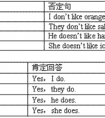用所给动词的适当形式填空。1. My brother's ______ (write) habits are not good.2. My mom goes shopping ______ (two) a week.3. She tries ______ (eat) a lot of-八年级英语
一、动名词作主语
1. 直接位于句首做主语。例如:
Swimming is a good sport in summer.
2. 用 it 作形式主语,把动名词(真实主语)置于句尾作后置主语。
动名词做主语时,不太常用 it 作先行主语,多见于某些形容词及名词之后。例如:
It is no use telling him not to worry.
常见的能用于这种结构的形容词还有:better,wonderful,enjoyable,interesting,foolish,difficult,useless,senseless,worthwhile,等。
注意:important,essential,necessary 等形容词不能用于上述结构。
3. 用于“There be”结构中。例如:
There is no saying when he'll come.很难说他何时回来。
4. 用于布告形式的省略结构中。例如:
No smoking ( =No smoking is allowed (here) ). (禁止吸烟)
No parking. (禁止停车)
5. 动名词的复合结构作主语
当动名词有自己的逻辑主语时,常可以在前面加上一个名词或代词的所有格,构成动名词的复合结构
(这时,名词或代词的所有格做动名词的逻辑主语)。
动名词的复合结构也可以在句中作主语。例如:
Their coming to help was a great encouragement to us.
二、动名词作宾语
1.作动词的宾语
某些动词后出现非限定性动词时只能用动名词作宾语,不能用不定式。常见的此类动词有:
admit, appreciate, excuse, stand, advise, allow, permit, avoid, consider, enjoy, finish
They went on walking and never stopped talking.他们继续走,说个不停。
I found it pleasant walking along the seashore.在海滩上走真是乐事。
Mark often attempts to escape being fined whenever he breaks traffic regulations.
每当马克违反交通规则时,他常常企图逃避罚款的处分。
2.作介词的宾语
We are thinking of making a new plan for the next term. 我们正考虑为下学期制定新的计划。
Shall we have a rest or get down to doing our work? 我们休息呢还是开始干活?
3.作形容词的宾语
The music is well worth listening to more than once. 这种曲子很值得多听几遍。
We are busy preparing for the coming sports meet. 我们正为马上到来的运动会忙着做准备。
三、动名词作表语
动名词作表语时句子主语常是表示无生命的事物的名词或what引导的名词性从句。
表语、动名词与主语通常是对等的关系,表示主语的内容,主语、表语可互换位置。
Your task is cleaning the windows. 你的任务就是擦窗户。
(Cleaning the windows is your task.)
What I hate most is being laughed at. 我最痛恨的就是被别人嘲笑。
(Being laughed at is what I hate most.)
四、动名词作定语
动名词作定语往往表示被修饰词的某种用途。如:
a walking stick =a stick for walking=a stick which is used for walking
a washing machine=a machine for washing=a machine which is used for washing
a reading room=a room for reading=a room which is used for reading
a measuring tape=a tape for measuring=a tape which is used for measuring
sleeping pills=pills for sleeping=pills which is used for sleeping
动名词也有时态和语态的变化,如表所示(以及物动词write为例),不及物动词没有语态的变化。
| 时态、语态 | 主动 | 被动 |
| 一般式 | writing | being written |
| 完成式 having written |
having been written |
1) 动名词做主语时,谓语动词为单数
2) 在动名词和不定式中,作为介词的宾语是动名词
3) 动名词的否定直接在其前加否定词,通过代词的宾格或所有格形式给出逻辑主语
例:I would appreciate you calling back this afternoon.
4) 有些词后只能接动名词
acknowledge;admit; advise;advocate;allow;appreciate; avoid; celebrate; consider; contemplate; defer; delay; deny;
detest; discontinue; dislike; dispute; enjoy; it entails; escape; excuse; explain; fancy; feel like; finish; forgive; can’t help;
hinder; imagine; it involves; keep; it means; mention; mind; miss; it necessitates; pardon; postpone; practice; prevent;
recall; report; resent; resist; risk; suggest; understand...
5) 另外还有一些接-ing形式的常用说法
it’s no good; it’s no/little/hardly any/ use; it’s not/hardly/scarcely use; it’s worthwhile; spend money/time; there’s no;
there’s no point in; there’s nothing worse than; what’s the use/point
6) 有些词后面加不定式和动名词均可
remember,forget,try,stop,go on,continue,stop,regret,cease,mean后面均可用不定式和-ing形式,但意义截然不容。
例:remember to do/doing:
①I remembered to post the letters.(指未来/过去未来将要做的动作)
②I remembered posting/having posted the letters.(我记得做过这个动作)
forget与remember的用法类似。
regret的用法:
①I regret to inform you that…(我很遗憾地通知你……)
②I regretted having left the firm after twenty years.(为了“二十年前的离开”而遗憾。)
try to(努力)与try +–ing(试验):
①You really must try to overcome your shyness.
②Try practicing five hours a day.
考点名称:频度副词
频度副词:
是表示动作发生频率的词。
常见的有:
ever, never, rarely, seldom, once, often, occasionally, constantly, frequently, usually,continually, always 等。
例如:He often came to see us.
She always was late.
常见频度副词在表示程度上有别,按频率大小排列如下:
always(100%)>usually(80%)>often(60%)>sometimes(40%)>seldom(20%)>hardly (10%)>never(0%)- 常见程度副词用法列举:
◆always 频率最高,表示动作重复、状态继续,表示“一直、总是”,其反义词为never。always等与not连用时,表示部分否定。如:
The rich are not always happy. 有钱的人并不总是快乐的。
如果要变为否定句,应将always改为never才能全部否定。如:
Li Ping is always late for school. 李平上学总是迟到。
Li Ping is never late for school. 李平上学从不迟到。(全部否定)
Li Ping is not always late for school. 李平上学不总是迟到。(部分否定)
频度副词通常和一般现在时连用,表示动作发生的频率。但always与进行时连用时,并不强调动作正在进行,而是表示赞叹、厌烦等情绪。如:
He is always thinking of others. 他总是想着别人。(赞叹)
She is always asking silly questions. 她总是问些愚蠢的问题。(厌烦)
The boy is always asking for money. 这个小男孩总是要钱。(厌烦)
◆usually意为“通常”,表示习惯性动作或状态,很少有例外。如:
We usually go to school at seven in the morning. 我们通常在早上七点上学。
My mother and I usually go shopping on Sundays. 我和妈妈通常在星期天去买东西。
◆Often意为“经常,时常”,表示反复性的动作或状态,中间有间断,不如usually那么频繁。其反义词是seldom。often在句尾时常被very或quite修饰。如:
It often rains here in April. 这儿四月份常下雨。
he boys often eat noodles and the girls sometimes eat them. 男生经常吃面条,女生有时吃。
I often chat with my friends under the big tree. 我经常在这棵大树下和朋友聊天。
He writes to his friends quite often. 他常给他的朋友写信。
◆sometimes意为“有时”,频率不及often,表示动作偶尔发生,间断时间较长。其位置比较灵活,放在句首、句中、句末都可。如:
Sometimes we go to the cinema and at other times we go for a walk.
有时我们去看电影,有时我们去散步。
I sometimes watch TV in the evening. 我有时晚上看电视。
My father has lunch in the factory sometimes. 我父亲有时在工厂吃午饭。
- 最新内容
- 相关内容
- 网友推荐
- 图文推荐
上一篇:I have no food; I will go _____this evening. []A. shopping B. shop C. to shop D. shopped -八年级英语
下一篇:Tony finished ________ the math book yesterday. He gave it to the library.[ ]A. to read B. readingC. write D. writing-八年级英语
零零教育社区:论坛热帖子
| [家长教育] 孩子为什么会和父母感情疏离? (2019-07-14) |
| [教师分享] 给远方姐姐的一封信 (2018-11-07) |
| [教师分享] 伸缩门 (2018-11-07) |
| [教师分享] 回家乡 (2018-11-07) |
| [教师分享] 是风味也是人间 (2018-11-07) |
| [教师分享] 一句格言的启示 (2018-11-07) |
| [教师分享] 无规矩不成方圆 (2018-11-07) |
| [教师分享] 第十届全国教育名家论坛有感(二) (2018-11-07) |
| [教师分享] 贪玩的小狗 (2018-11-07) |
| [教师分享] 未命名文章 (2018-11-07) |

![Which of the following can you probably see in the meeting room? [ ]A. B. C.D. -七年级英语](http://www.00-edu.com/d/file/ks/4/2/dongmingci/2020-01-08/small97361980a56115e1c9237567439904fe1578422951.jpg)

![—Can the boy finish_____ the book in about a week? —I think he can. [ ]A. read B. reading C. to read D. reads -八年级英语](http://www.00-edu.com/d/file/ks/4/2/dongmingci/2020-01-08/smallfa4d713075e249356362fe7392193a301578421751.png)


